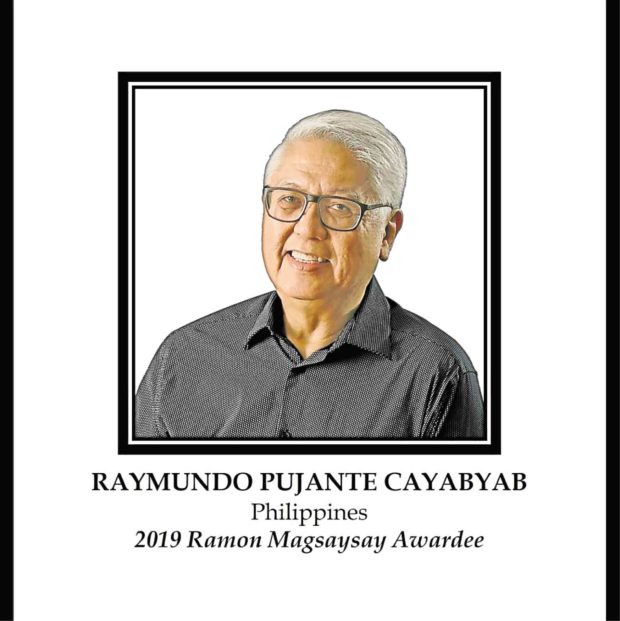OPM icon Ryan Cayabyab, 4 other Asian voices earn Magsaysay awards

Credit to Author: racosta| Date: Fri, 02 Aug 2019 22:05:12 +0000
For “defining and inspiring Filipino popular music across generations,” National Artist for Music Ryan Cayabyab has been named one of five recipients of this year’s Ramon Magsaysay Award, considered Asia’s equivalent to the Nobel Peace Prize.
The Ramon Magsaysay Award Foundation (RMAF) cited Cayabyab for his unparalleled contributions as a composer, director and performer that largely defined contemporary Philippine music. He was also recognized for his “indomitable, undeterred confidence to selflessly seek, mentor and promote young Filipino musical genius for the global stage, and [for] showing us that music can instill pride and joy and unify people.”
Cayabyab, considered an icon of Original Pilipino Music (OPM), is the sole Filipino among this year’s awardees, who will each receive a certificate, a medallion engraved with the image of former President Ramon Magsaysay, and a cash prize during awarding ceremonies on Sept. 9 at the Cultural Center of the Philippines.
Awardees
The other awardees are journalists Ravish Kumar, executive director of New Delhi Television Network, who was feted for “harnessing journalism to give voice to the voiceless” in India as anchor of a program that deals with real life, under-reported problems of ordinary folk, and Ko Swe Win, editor in chief of Myanmar Now, an independent online news site focused on long-form investigative pieces in both Burmese and English. He was cited for “building the quality and force of media’s truth-telling.”
Moral courage
Also included in the 61st batch of RM awardees is former Thai human rights commissioner Angkhana Neelapaijit, for “championing justice, case after painful case,” through her Justice for Peace Foundation, a network of human rights and peace advocates that provides legal assistance to victims of rights violations.
The fifth awardee is youth and mental health advocate Kim Jong-ki of South Korea, who established the Foundation for Preventing Youth Violence after his own son committed suicide. He was honored “for stemming the destructive tide of youth violence.”
RMAF president Carmencita Abella said this year’s laureates were chosen for “show(ing) moral courage and impassioned insistence on making the societies that they serve better, kinder and more equitable for everyone, especially the marginalized.”
Reshaping OPM
Unlike his fellow awardees whose lives were defined by overt social activism, Cayabyab spent much of his time reshaping OPM from behind the scenes at a time when globalization and Western-oriented streaming posed existential threats to local musicians.
Cayabyab, 65, was born in a modest home and was said to take after his mother Celerina Pujante, an opera singer and music teacher who had initially wanted the young Ryan to take up anything except music. But the young prodigy would later earn a full scholarship to attend the University of the Philippines as a music major.
National Artist
Four decades later, Cayabyab’s prodigious work would cross mediums: he worked on commercial recordings for film scores, music albums and television, and also wrote multiawarded pieces for chorale and theater.
In 2018, he was awarded the Order of National Artist by the National Commission for Culture and the Arts for his music “that extols the exuberance of life and human happiness, thus capturing the very essence of Filipino soul.”
While best known for mellow ballads—“Kailan,” “Tuwing Umuulan At Kapiling Ka,” “Can This Be Love,”—the maestro also wrote probing, critical songs like “Freedom” (How many more years of suffering and tears/Must we forever endure all the pain and the fears?/Will our voices finally reach the gods of democracy?), and “Paraiso” (“This tired and hungry land could expect/Some truth and hope and respect/From the rest of the world).
First big break
“[Cayabyab] is being recognized for his compositions and performances that have defined and inspired Filipino popular music across generations,” said RMAF chair Jose Cuisia Jr. “[Cayabyab shows us that] music can indeed instill pride and joy, and unify people across the many barriers that divide them,” he added.
Of all his songs, “Kay Ganda ng Ating Musika” perhaps resonates closest to how Cayabyab looks at music: “From the first moment that I learned to sing/My little world suddenly became more colorful/I realized that melody was like a river/It runs deep like love/And overflows in my soul.” The song provided him his first big break when it won the grand prize in the Metro Manila Popular Music Festival in 1978, and in an international song festival in South Korea that same year.
Mentor, role model
The maestro was also mentor and role model to several music luminaries, among them Broadway singer and Tony award winner Lea Salonga, composers Ogie Alcasid, Noel Cabangon and Jim Paredes, and pop singers Regine Velasquez and Sarah Geronimo.
Over the years, Cayabyab taught thousands of music enthusiasts across the country, cementing his legacy in contemporary music. He continues to lead the Music School of Ryan Cayabyab, a specialty school that offers vocal, piano, violin, drums and music theory courses.
“The next generation should be better than us for our country to move forward,” Cayabyab said. “For this to happen, we must teach them everything we know at every possible instance. I like teaching, I like sharing what I know and I like music. When I’m doing all these, I’m very happy,” he said.
For the RMAF, Cayabyab’s indelible influence in fostering Filipino cultural identity through music made him a singularly compelling and unifying force amid great divisiveness.
The RM Award, named after the country’s well-loved President Ramon Magsaysay, was established in April 1957, by the trustees of Rockefeller Brothers Fund based in New York City with the concurrence of the Philippine government. It is considered the highest award given to Asian individuals and organizations.